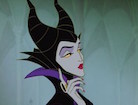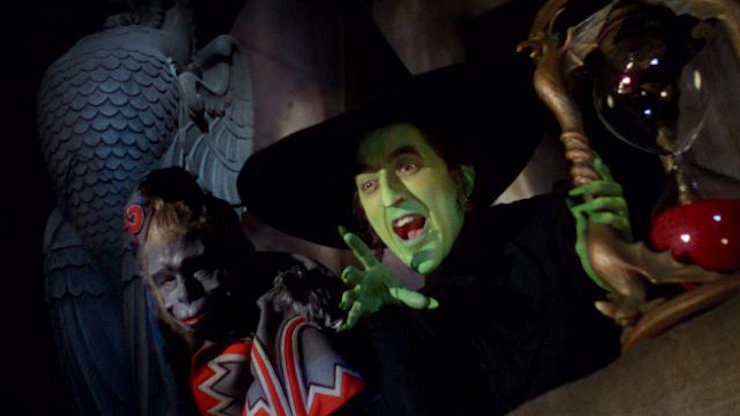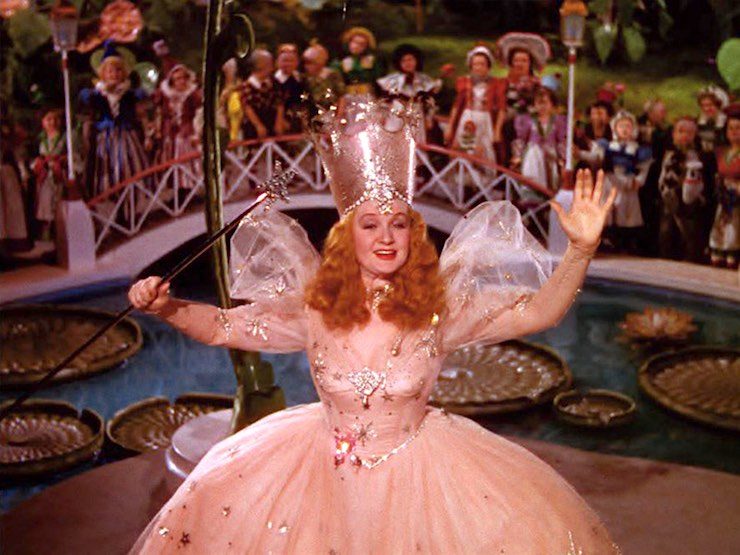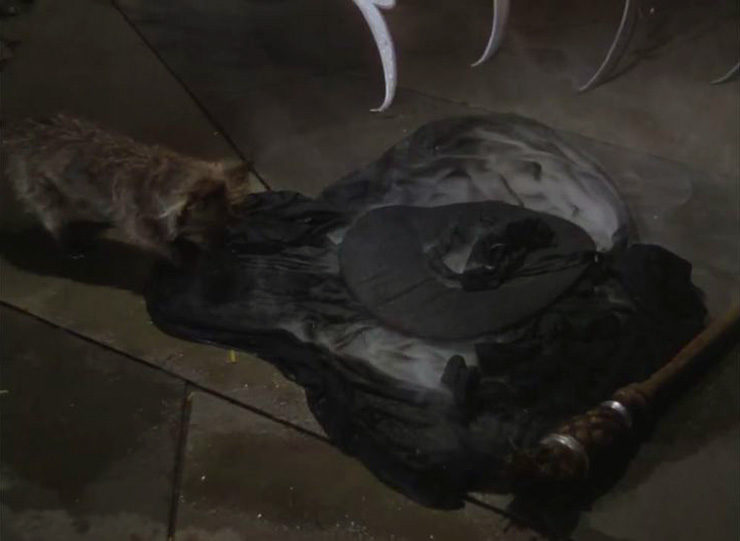Powers.
Fictional witches come in many forms—good and bad, of the East and of the West, Baba Yaga and Sabrina. They live in towers, or in boarding schools, or in castles, or in the woods. They eat children or they brew tea. But they all have one thing in common: powers.
The power to ride across the sea in a teacup. The power to disguise their withered husks as young and beautiful. The power to make monkeys fly.
When we write witches into our stories, that is what we’re writing about: power. When we write witches, we are writing about our expectations of women, and what we hope—and fear—they would do if they had access to power. Fictional witches act as ciphers that help us understand something that seems at once mysterious and brilliant and sinister: a woman’s ultimate, unlimited potential… realized.
Some of us write witches who use their powers to perform small, domestic tasks—tending to illnesses, baking really really good bread, sweeping the floor without a broom. These witches don’t complain. They’re satisfied: they don’t see any need for acclaim, recognition, institutional authority. They’re content on their own in the woods or in the village, brewing nettle tea and making pasta for their neighbors, or drifting around inside bubbles. They don’t have a family, and they don’t have children of their own—but lonely? Never. They have cats and crows to keep them company, and they have the people of the local villages to support. They have the occasional lost farmgirl to guide, and that’s enough for them. They don’t want money or economic independence; so long as they have enough to eat and a warm fire to put their feet up next to, they’re content to care for people. Their magic is focused on other people and perhaps the occasional sparkly dress. They’re pleased with a life of understatement, of service. Of soft-spoken humility. They are the ultimate mothers, grandmothers, godmothers, housewives, and maidservants to the world of the un-magic. These are the Good Witches.
Then there are the Frivolous Witches—the Sabrinas and the Louise Millers, rapping teenaged fashionistas who use their powers for status and wind up hating the results. These witches learn—or never seem to learn, but we know that they ought to learn—that power is more trouble than it’s worth. They are young and frustrated. They frequently wind up wishing that they had never developed their powers in the first place. They are what we expect teenage girls to be, and the ultimate moral of their story is the thing towards which our culture constantly guides teenage girls: you can’t win, no matter what you do, and the harder you try, the farther you’ll fall. They eventually discover that the only righteous path open to them is that of the Good Witches, maternal and kind and yielding. They discover that they are supposed to take that path, even if they secretly yearn for something… else.
Finally, there are the witches who will never be satisfied with the power they have. Once they have a taste, they’ll want more—they’ll hunger. Marriage won’t satisfy them, and service won’t satisfy them. It will never be enough for these witches to control the forces of the cosmos. These witches will build castles and towers, and they’ll peer out over the kingdoms of men with a hungry eye. They’ll let their hair get wild and they’ll howl into the wind, furious that they don’t yet have a throne. Or they’ll have a throne, and still, they’ll find dissatisfaction in something as small as a girl more beautiful than they are. They’ll demand independence. They’ll be childless, or the only children they’ll have will be the ones they steal. They’ll demand more than they have, and they won’t stop demanding until the world itself is softening in their cauldron.
These, of course, are the Bad Witches. They’re the scary witches. They are villainesses of the highest order, and they’re frequently served up as cautionary tales. What happens to witches when they have power and they use it for personal gain? Inevitably, they enjoy a brief stint as a wondrous and terrifying despot—but then they fall, usually to fire or humiliation.
Witches serve as a tidy packet of expectations for our consumption, and outcomes go hand-in-hand with those expectations. Here, the stories say, is a woman with power. Finally! What you’ve all been secretly wanting, all your lives! Power! Even more power than mortal men. Now that this woman has that power, what will she do with it? What will become of her?
These outcomes reveal whether we are supposed to be hopeful or fearful. The Good Witches—the humble, the meek, the kind, the patient, the servile—they get to live. They represent a hopeful outcome. They’re never displayed as allegorical representations of unrealized potential. Instead, these Good Witches are written as signposts of virtue and hope. They have power, but they don’t use it for anything big or showy. It’s comforting: these witches support the status quo. They remind us of the caregivers we’ve looked to all our lives; we would feel comfortable asking them for help. If women were to get their hands on power, these stories say, perhaps they would simply continue doing what women do. Perhaps they would keep quietly taking care of everyone around them. It wouldn’t be so bad. It’s not so very frightening to consider letting them have that power, is it?
The Bad Witches, meanwhile, represent a fearful outcome. They’re the cold sweat in the middle of the night, sitting bolt-upright in bed: if you give them power, they will stop being women; they will become monsters. They turn ugly and hungry and they use that power as power has been used against them. They seek vengeance. They seek satisfaction. They seek blood. They reach beyond their grasp, and it breaks them. They grow vain and cold and imperious. They try to act like Kings, and in the end, they simply have to die. They have to die as retribution for making us afraid—and as justification for our fear.

Remember, the stories tell us.
Look at what happens, and remember.
But in recent years, we have begun to see another way—the Hermione Grangers and the Tiffany Achings represent a new, ambiguous generation of witches in modern media. We see in them the seeds of power and ambition and potential, and we wait for them to fall—but they don’t. They are allowed to flourish and grow. They are nurtured, and they reach for things, and they don’t lose track of what’s important to them even as they become more than what they once were; even as they become more than what we expected them to be. These witches—these few, great witches—are just like all witches, in that they are written with an eye to what might happen if women are given access to unlimited power. And they are unique among hundreds of witches across the entire history of storytelling, because they alone point to a truly hopeful possibility: that a witch could use her unlimited power for progress, and for change. For freedom, and for justice, and for growth.
They outline a new narrative for witches—that they might use their powers not for Good, and not for Evil, but for Greatness. And they let us ask again the question we have always been asking of witches: with access to unlimited power, what might they become?
Sarah Gailey is too witches. Her fiction has appeared in Mothership Zeta and Fireside Fiction; her nonfiction has been published by Mashable and Fantasy Literature Magazine. You can see pictures of her puppy and get updates on her work by clicking here. She tweets @gaileyfrey. Watch for her debut novella, River of Teeth, from Tor.com in 2017.













I really liked this, and your exploration of our expectations of women with power, but I wonder about your conclusion:
I feel like, tragically, it’s only recently that we get to ask “might” rather than “must”. I think when we say “bad witches,” that qualifier is only recently necessary. The reality is that the default state of witches through history is the bad witch. Witches express the (male) fear that if you give a woman power and autonomy, free from the shackles of a family or a husband or the rules we’ve set for them, they inevitably must become these monsters. Even stories without magic cast old women who live alone as “witches”—because we don’t conceive of a woman living alone, possibly even choosing to do so for her entire life, as anything other than incredibly sinister. We aren’t wondering if women with power might go bad, we assume they will and teach our children to fear them accordingly.
It’s when we get to Good Witches that the qualifier becomes necessary. Here is where we’ve finally conceded that some women may sometimes have power and autonomy, but now we’re dictating that if this is the case then you must embody the “good” version. Selfless, caring, nurturing. Your power and freedom must only be exercised in service, never for yourself. (I’d say the frivolous witch is the cautionary tale to steer this otherwise headstrong Tiffany Aching down the right and proper path).
In light of that, I think it’s wonderful that the new narrative for witches isn’t just that they can be great, but that they can be great for themselves.
(I realize this is a very male view of this subject, and I really hope I didn’t just mansplain witches on your wonderful article. But reading your piece just made me consider for the first time what witches in fiction mean to men, and it was horrifying.)
Yeeessssss I love this. Fewer cautionary tale witches, more badass world-changing witches please! :D
Also, shameless book plug if you’re looking for more great witches – Sorcerer to the Crown by Zen Cho: https://www.goodreads.com/book/show/23943137-sorcerer-to-the-crown
Another common feature of Good Witches (and some Bad Witches) is that they are static. They are simply there, puttering around a cottage and waiting for the Hero to show up. They’ve grown old but they aren’t going to grow older. Their magic has granted them a perpetually comfortable dotage, with no threat of continued decline and eventual death. The elderly people I know are aware that their independence and situation are highly dependent on their health and they deal with it in their various ways.
I want a story about how witches deal with the loss of independence. What do you when your magic is no longer enough to compensate for the frailties of old age? How do other witches react when one of their number can’t maintain her cottage?
@3 – Have you read any of Pratchett’s Tiffany Aching books? I think you might find at least some of that, especially A Hat Full of Sky, Wintersmith, and The Shepard’s Crown.
Hah, I was totally going to mention Hermione – she’s a ‘good witch’ but I would never call her meek or servile! (Although in truth I find it demeaning to refer to people with a caregiver type personality as such). Nor is she showy or power hungry or a monster.
There is also probably an overlap in general with stories about magic, power, etc about what happens when a person (of any gender) has unfettered access to that power and uses it for selfish ends and does in fact become a monster. But with witches it also overlaps with various gendered expectations.
Ooh, just had a thought*
WITCH = Woman In Total Control of Herself.
*based on a song by Saffire: The Uppity Blues Women. The original started with Being.
@@.-@ Thanks, I’ll give it a try. All too often, it seems like the only way to get the story I want would be to write it myself. While it’s certainly good motivation, I don’t really think I could pull it off.
*goes to check the Discworld flowchart*
#3 In many stories the elderly failing witch takes on a girl apprentice and teaches her important stuff. Unfortunately, this is the girl’s story so the witch dies before the most of the important stuff is shared so the girl has a rough go of it.
Pratchett’s witches, and Tiffany Aching especially, were a big influence in my choice to become a (male) social worker. They are my fictional role models.
@9 That may be the greatest tribute to Pratchett and his witches I’ve read anywhere.
Hermione Granger – interestingly enough – one who used her powers to maim another girl for life by use of a magical “contract”. Not all strong witches are role models in every respect, I feel.
Please remember that Wicca, and Witchcraft are also contemporary religions. Images of Jews stealing babies and money, and images are Blacks drawn with monkey features are images of intolerance that are not acceptable in today’s society. One can hope that the images of Witches with green skin and and long, pointed noses will similarly become unacceptable.
Blessed Be.
Correction to @12’s common misconception in order to prevent further spread of misinformation:
While Wicca is a religion, Witchcraft is NOT. Witchcraft is a practice, not a form of worship. Not all witches are pagan nor even believe in any god(s) (and that includes the also common misconception of worshipping “the Devil”).
There are witches of ALL different denominations (including, but not limited to Wicca) as well as atheist and agnostic witches, so while their practice of witchcraft can be influenced by their religious beliefs, IT IS NOT DEPENDENT ON THEM. /end rant :)
Note that Pratchett was blowing up the conventional model(s) of witches long before Tiffany Aching; I’ve seen readers say that Pratchett hinted (at least) that the family matriarch Nanny Ogg was not just a force to be reckoned with but a more powerful witch than Granny Weatherwax. (And note that Weatherwax is clearly a good witch but not a Good Witch; she terrifies people not because she’s evil but because she treats them justly.) For that matter, I would love to have seen a longer character arc for Magrat — she had so much potential, especially once she got her own base instead of being a sort of third wheel or contrast. I suppose Aching is part of that; she had enough spine early on to make Weatherwax respect her.
“They outline a new narrative for witches—that they might use their powers not for Good, and not for Evil, but for Greatness. And they let us ask again the question we have always been asking of witches: with access to unlimited power, what might they become?”
If they have unlimited power and they want to be great more than they want to be good, then they’ll inevitably end up being evil. Actual evil, the kind we see in the real world, isn’t usually about cackling and kicking puppies. It’s frequently about making yourself the center of the universe and turning everybody else into a prop or an obstacle. That kind of evil is about falling in love with your own narrative, your own success story, and forgetting that your actions have consequences for the people around you.
Hermione Granger wants to be the top student. She wants success and recognition and the kind of power that comes from being the smartest person in the room. But she founds SPEW because she doesn’t just want to be a winner; she wants other people to win. She wants to live a life of service because that’s the only life worth living.
Being good doesn’t mean doing what other people tell you to do. It doesn’t mean “helping” them by giving them everything they want. It does mean recognizing that selfishness is not a virtue. History books are filled with great and famous and powerful people who got everything they wanted at the cost of everyone around them. Good witches recognize that we are all bound together in an inescapable web of mutuality; bad witches believe in empowerment exclusively for themselves, no matter what it costs other people.
Glinda the Good ruled her own country and had her own, all female army. Although the Wizard of Oz starts off as a fake, she eventually agrees to take him on as an apprentice.
Tiffany Aching and Hermione Granger know that the power is not limitless, and that using the power carelessly is dangerous. They demonstrate that the essence of powerful women is that they understand and accept responsibility. That’s what I think is important about the witch in modern fiction.
As for the notion about “good” witches, I really love Terry Pratchett’s stories Witches Abroad and Wyrd Sisters, which do an excellent job deconstructing the “good witch.”
Another good example of witches are in Diane Duane’s “So You Want To Be A Wizard” series. The girls want to learn and help people, but they also get to travel to new worlds and be leaders.